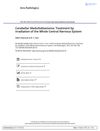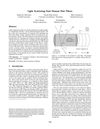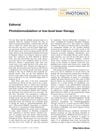 165 citations,
June 2007 in “European Journal of Cell Biology”
165 citations,
June 2007 in “European Journal of Cell Biology” Hair follicle stem cells are key for hair and skin regeneration, can be reprogrammed, and have potential therapeutic uses, but also carry a risk of cancer.
165 citations,
December 2004 in “Differentiation” BMP signaling is crucial for skin and hair growth.
 165 citations,
September 2003 in “Toxicology and applied pharmacology”
165 citations,
September 2003 in “Toxicology and applied pharmacology” Blocking COX, especially COX-2, in the skin can reduce inflammation and pain and may help prevent skin cancer.
 165 citations,
December 2002 in “Molecular and Cellular Endocrinology”
165 citations,
December 2002 in “Molecular and Cellular Endocrinology” Male hormones, particularly DHT, are linked to male pattern hair loss, and treatments like finasteride can help, but they don't work for postmenopausal women's hair loss, which may have different causes.
 165 citations,
February 1994 in “Fertility and Sterility”
165 citations,
February 1994 in “Fertility and Sterility” Flutamide is more effective and has fewer side effects than spironolactone for treating hirsutism.
165 citations,
July 1992 in “Annals of Internal Medicine” Herbal products can be dangerous and cause serious health issues.
 164 citations,
January 2014 in “Journal of Cutaneous and Aesthetic Surgery”
164 citations,
January 2014 in “Journal of Cutaneous and Aesthetic Surgery” PRP injections increase hair density and satisfaction in androgenetic alopecia patients.
164 citations,
September 2010 in “PLANT PHYSIOLOGY” Nitric oxide helps Solanum nigrum adapt to long-term zinc toxicity by changing root growth and metal balance.
164 citations,
February 2010 in “Journal of Cell Science” Human dermal stem cells can become functional skin pigment cells.
 164 citations,
April 2008 in “Cochrane library”
164 citations,
April 2008 in “Cochrane library” Current treatments for alopecia show no significant long-term benefits.
 163 citations,
March 2012 in “BMC biology”
163 citations,
March 2012 in “BMC biology” Stem cell niches support, regulate, and coordinate stem cell functions.
 163 citations,
November 2003 in “Journal of Investigative Dermatology”
163 citations,
November 2003 in “Journal of Investigative Dermatology” Low iron levels may be linked to some types of hair loss in women.
163 citations,
October 2001 in “EMBO journal” Overexpressing follistatin in mice delays wound healing and reduces scar size.
 163 citations,
April 1953 in “Acta radiologica”
163 citations,
April 1953 in “Acta radiologica” Radiation therapy with a higher dose for the brain improves survival in cerebellar medulloblastoma.
 162 citations,
April 2016 in “The Lancet Diabetes & Endocrinology”
162 citations,
April 2016 in “The Lancet Diabetes & Endocrinology” Testosterone therapy in transgender men has both desired effects like increased muscle mass and potential health risks such as higher cardiovascular risk.
 162 citations,
January 2015 in “Trends in Endocrinology and Metabolism”
162 citations,
January 2015 in “Trends in Endocrinology and Metabolism” Women with PCOS face higher risks of diabetes and heart disease, and these risks increase with obesity.
162 citations,
October 2014 in “Autoimmunity reviews” Alopecia areata is caused by the immune system attacking hair follicles.
 162 citations,
July 2011 in “Biomacromolecules”
162 citations,
July 2011 in “Biomacromolecules” Chitosan nanofiber scaffolds improve skin healing and are promising for wound treatment.
 162 citations,
August 2005 in “The journal of investigative dermatology/Journal of investigative dermatology”
162 citations,
August 2005 in “The journal of investigative dermatology/Journal of investigative dermatology” The new "differential stripping" method effectively measures how much substance gets into hair follicles.
 162 citations,
August 2004 in “Journal of Investigative Dermatology”
162 citations,
August 2004 in “Journal of Investigative Dermatology” Hair loss causes stress and affects mental health; treatment and support needed.
 162 citations,
August 2002 in “Survey of Ophthalmology”
162 citations,
August 2002 in “Survey of Ophthalmology” Latanoprost can make eyelashes longer, thicker, and darker.
 161 citations,
August 2013 in “Journal of experimental botany”
161 citations,
August 2013 in “Journal of experimental botany” Certain inhibitors slow down plant growth by causing early cell specialization without changing the cell development pattern.
161 citations,
August 2012 in “Seminars in cell & developmental biology” Hair growth and development are controlled by specific signaling pathways.
 161 citations,
July 2003 in “ACM Transactions on Graphics”
161 citations,
July 2003 in “ACM Transactions on Graphics” Researchers developed a new model for more realistic computer graphics rendering of hair by considering how light scatters on hair fibers.
161 citations,
June 1994 in “The journal of investigative dermatology/Journal of investigative dermatology” Hair stops producing melanin as it transitions from the growth phase to the resting phase.
 160 citations,
January 2009 in “Clinical Drug Investigation”
160 citations,
January 2009 in “Clinical Drug Investigation” HairMax LaserComb® effectively promotes hair growth and stops hair loss in males with androgenetic alopecia, with no serious side effects.
 160 citations,
January 2017 in “Development”
160 citations,
January 2017 in “Development” Blood vessels and specific genes help turn cartilage into bone when bones heal.
 160 citations,
December 2016 in “Journal of biophotonics”
160 citations,
December 2016 in “Journal of biophotonics” Low-level laser therapy, now called photobiomodulation, is recognized for its broad medical applications and scientific backing.
160 citations,
April 2014 in “Drug discovery today” Melatonin helps regulate sleep and may aid in treating various health issues.
 160 citations,
January 2014 in “Seminars in cell & developmental biology”
160 citations,
January 2014 in “Seminars in cell & developmental biology” Early development of hair, teeth, and glands involves specific signaling pathways and cellular interactions.





















